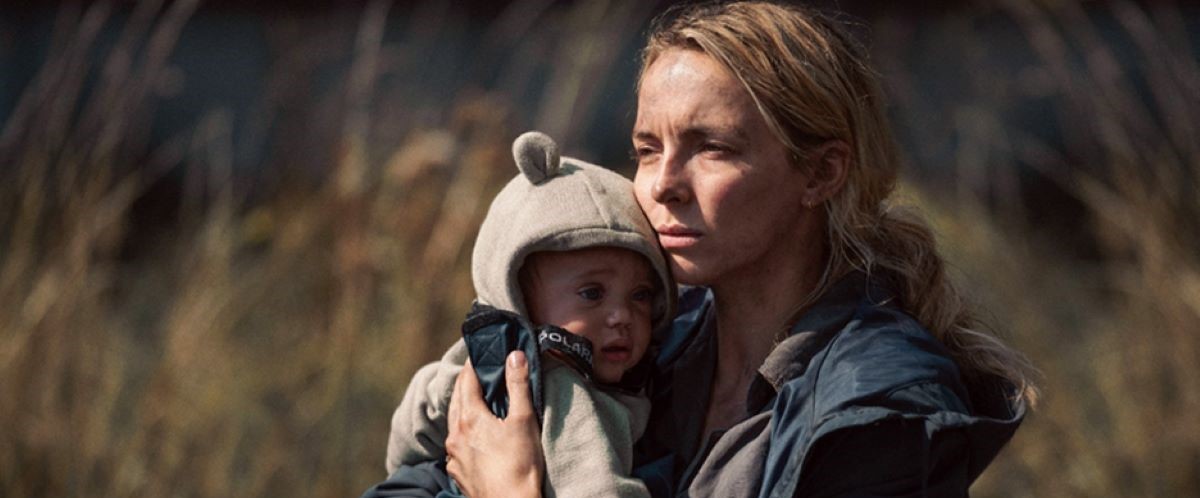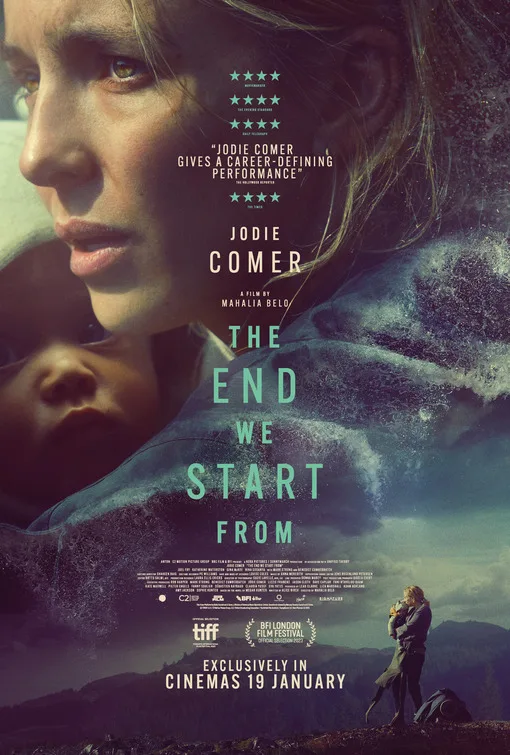Following a woman trying to survive an environmental catastrophe with her newborn baby, “The End We Start From” begins with a modest yet clever scene, thoroughly in step with the simple (though far from simpleminded) picture that we’re about to see. The camera is fixated on a shot of a bathtub, which a loudly running tap is slowly filling. And just like the world the film is set in, our screen gradually starts looking like a container that might soon overflood with water.
Imagined by director Mahalia Belo, this unassuming set-up is a brilliantly apt way to kickstart things in the intimate sci-fi film that follows—one that is about a huge disaster, but doesn’t include massively scaled, “I Am Legend”-level visuals to cue one in on the scope of the crisis. Instead the focus, captured with a rare sense of immediacy by cinematographer Suzie Lavelle, remains on the nameless people navigating it with their blood, sweat and tears. In that, “The End We Start From” is down-to-earth, beautifully conceived and thoughtful, a shrewd piece of filmmaking in support of the story’s thematic preoccupations, particularly motherhood.
The mother in question is played by Jodie Comer, one of the most exciting actors working today across the likes of “Killing Eve,” Ridley Scott’s tragically underseen “The Last Duel” and Jeff Nichols’ virtuosic “The Bikeriders.” (That last one is a festival-circuit darling that will meet general audiences in 2024 and further prove all that Comer can master effortlessly.) Here, she’s named Mother—just mother. When she submerges her very pregnant body into the aforesaid bathtub at the start is when the rain outside her London home dials up its aggressive takeover and leaks into her household. Then, on the heels of a very realistic birthing scene (one must be thankful for woman writers-directors for not mincing words or sugarcoating the experience of it all), she finds herself in an unlivable house along with her husband (Joel Fry, with a palpable blend of vulnerability and fear). And so, up to the north they go for a temporarily comfortable domestic set-up to wait it all out, until another tragedy emerges and puts the mother and her son on the road again.
Adapted from Megan Hunter’s novel by screenwriter Alice Birch—the scribe of “Normal People,” as well as the glorious adaptations of the very feminine “Lady Macbeth” and “The Wonder”—“The End We Start From” urgently (and lovingly) honors the impossible task of walking the earth in a woman’s shoes, sprints, stumbles and all. Much of it naturally rests on Comer’s shoulders and in her sturdy steps, as the mother fights her way through the woods and shelters, often on the cusp of near-fatal danger. Comer is simply terrific in telegraphing her character’s determination and sometimes, desperation. Simply put, if Mother is mostly acting on a mama bear’s instinct of protecting her offspring, Comer is acting from a place of internalizing those instincts and transposing them on her expressive face, one intense act at a time.
On the whole, “The End We Start From” is an anxiety-inducing experience, not due to loud explosions or effects-driven set pieces, but due to things that feel real and grounded in truthful observations about motherhood, sisterhood and all the so-called support systems on which we might be blindly relying. And didn’t we learn that very thing during Covid, once the banging of pots and pans quieted down and the shared sense of “we’re all in this together” gave way to selfishness? It was a period that showed us first hand that in the worst of times, we might be more alone than we think, with only a handful of our nearest and dearest to lean on. “The End We Start From” rings largely true for that reason, for the mother is mostly solitary, a reality that requires her to make questionable decisions from time to time in order to stay in the game of survival. Still, other unnamed personalities enter her world throughout the journey—one of them is played by the equally wonderful Katherine Waterston, a mom like Comer’s character, supportive and competent. Another is Benedict Cumberbatch in a lush scene where the mother can finally cut loose a little.
The energy of “The End We Start From” doesn’t always sustain itself, as the story runs out of risky ideas to put Comer in danger’s way. But her performance rises about all such minor obstacles. It’s her film, and we’re just lucky to be living in it for a while.
In theaters now.




















